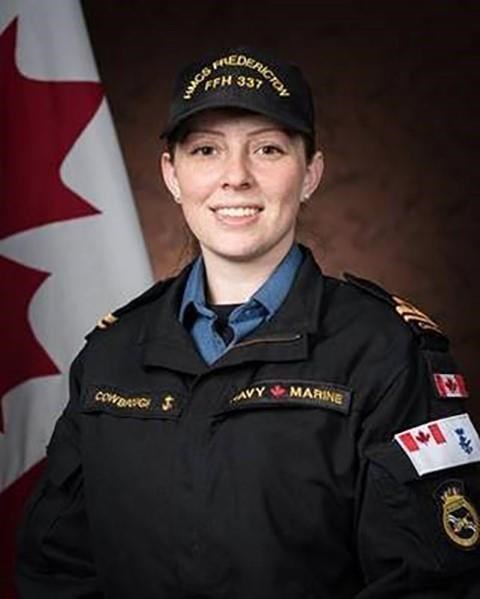HALIFAX — The remains of Sub-Lt. Abbigail Cowbrough, a Royal Canadian Navy sailor killed last month in a helicopter crash off the coast of Greece, arrived in Halifax on Monday and were taken by police-escorted motorcade to a local funeral home.
Thousands of people — many of them military members in uniform — lined the route as the motorcade travelled from Halifax Stanfield International Airport to HMC Dockyard along the city's waterfront — home to the Royal Canadian Navy's Atlantic fleet.
As the sun was setting, the procession then headed to the Atlantic Funeral Home in Dartmouth, which is on the east side of Halifax harbour. The motorcade included more than 100 motorcycles.
The 23-year-old marine systems engineering officer was originally from Toronto but made her home in Dartmouth area.
Friends and family have described the young woman as charismatic and determined with a bubbly personality and a love of music.
An accomplished bagpiper and Highland dancer, Cowbrough attended Royal Military College in Kingston, Ont., where she was in charge of the pipe band for a semester.
"We appreciate the outstanding support of our communities towards the families of our fallen and the Canadian Armed Forces," the military said in a statement Monday.
Claudia Chender, the member of the provincial legislature for Dartmouth South, said she was feeling a mix of sadness and solemnity about the procession. She recalled Cowbrough's recent tribute to those killed by a lone gunman in northern and central Nova Scotia.
"Watching the video of her playing the pipes for the victims of the mass shooting last month makes her passing and her connection to the community even more vivid, and more poignant," Chender said in an email.
"I offer my sincere condolences to her friends, family, church and military family."
The helicopter carrying Cowbrough, a relatively new CH-148 Cyclone, crashed into the Mediterranean Sea on April 29, killing all six military members aboard.
On Sunday, officials in Ontario identified the remains of Capt. Brenden Ian MacDonald of New Glasgow, N.S., a Royal Canadian Air Force pilot and the second victim to be found after the crash.
The other four Canadian Armed Forces members — Capt. Kevin Hagen, Capt. Maxime Miron-Morin, Sub-Lt. Matthew Pyke, and Master Cpl. Matthew Cousins — are missing and presumed dead, but a search is continuing for their remains.
"The CAF community expresses its deepest condolences to the families, friends and colleagues of all our six members," the Defence Department said in a statement on the weekend. "We hope that they can find some comfort in knowing that we are all grieving with them."
The helicopter crash, the cause of which remains under investigation, represents the largest loss of life in one day for the Canadian Armed Forces since six Canadian soldiers were killed in a roadside bombing in Afghanistan on Easter Sunday 2007.
The Cyclone was deployed aboard the Halifax-based frigate HMCS Fredericton as part of a NATO mission patrolling the Mediterranean and Black seas. The military says the aircraft was returning to the ship after a training exercise when it hit the water.
The depth of the water at the crash site is about 3,000 metres.
Military statements, and chief of the defence staff Gen. Jonathan Vance himself, first said the ship had "lost contact" with the helicopter, though the Forces later acknowledged that crew aboard the warship saw it crash into the water.
The helicopter's flight-data and cockpit voice recorders, which floated free of the wreckage, are being examined in Canada.
The Defence Department says a team that includes social workers and military chaplains has been deployed to Italy to provide mental health support to Fredericton's crew, who have been allowed to communicate with loved ones back home.
The frigate left its home port with the Cyclone for a six-month deployment in January as part of a task force charged with deterring Russian aggression in the region.
The Cyclone was based at 12 Wing Shearwater, a sprawling Royal Canadian Air Force base on the east side of Halifax harbour, southeast of Dartmouth.
Since Canada has only two maritime helicopter bases — the other is at Patricia Bay, north of Victoria — the aircrew that work with the Cyclones tend to stay put for long periods of time, local resident Kevin Deveaux said in a recent interview.
"This is a very military community," said Deveaux, a former politician who represented Cole Harbour-Eastern Passage in the provincial legislature between 1999 and 2007.
"Either you're in the military, you have a relative in the military or you have a neighbour in the military."
This report by The Canadian Press was first published on May 11, 2020.
Michael MacDonald, The Canadian Press




